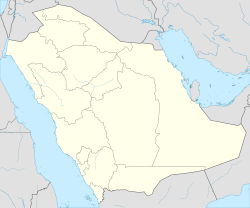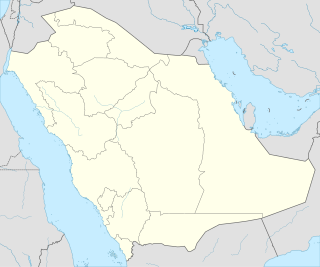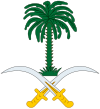
The politics of Saudi Arabia takes place in the context of a totalitarian absolute monarchy with Islamist lines, where the King is both the head of state and government. Decisions are, to a large extent, made on the basis of consultation among the senior princes of the royal family and the religious establishment. The Qur'an is declared to be the constitution of the country, which is governed on the basis of Islamic law (Shari'a). The Allegiance Council is responsible to determine the new King and the new Crown Prince. All citizens of full age have a right to attend, meet, and petition the king directly through the traditional tribal meeting known as the majlis.

Riyadh or Riad is the capital and most populous city of Saudi Arabia, approximately 790 km (491 mi) North-east of Mecca. It is also the capital of Riyadh Province and belongs to the historical regions of Najd and Al-Yamama. It is situated in the centre of the Arabian Peninsula on a large plateau and home to more than six million people.

Wahhabism is an Islamic doctrine and religious movement founded by Muhammad ibn Abd al-Wahhab. It has been variously described as "ultraconservative", "austere", "fundamentalist", or "puritan(ical)"; as an Islamic "reform movement" to restore "pure monotheistic worship" (tawhid) by devotees; and as a "deviant sectarian movement", "vile sect" and a distortion of Islam by its detractors. The term Wahhabi(sm) is often used polemically and adherents commonly reject its use, preferring to be called Salafi or muwahhid. claiming to emphasize the principle of tawhid, for exclusivity on monotheism, dismissing other Muslims as practising shirk, (idolatry). It follows the theology of Ibn Taymiyyah and the Hanbali school of jurisprudence, although Hanbali leaders renounced Abd al-Wahhab's views.

The House of Saud is the ruling royal family of Saudi Arabia. It is composed of the descendants of Muhammad bin Saud, founder of the Emirate of Diriyah, known as the First Saudi state (1744–1818), and his brothers, though the ruling faction of the family is primarily led by the descendants of Ibn Saud, the modern founder of Saudi Arabia. The most influential position of the royal family is the King of Saudi Arabia. King Salman, who reigns currently, chose first his nephew and then his son as the crown prince without consulting the Allegiance Council. The family is estimated to comprise 15,000 members, but the majority of the power and wealth is possessed by a group of about 2,000 of them.
The Saudi Arabia national football team represents Saudi Arabia in international football. The team's colours are green and white. Saudi Arabia are known as Al-Suqour and Al-Akhdhar.
Saudi Stock Exchange or Tadawul is a stock exchange in Saudi Arabia. It is supervised by the Capital Market Authority. The Tadawul All-Share Index (TASI) reached its highest point at 20,634.86 on 25 February 2006. It lists 171 publicly traded companies. As of August 20, 2017, its trading hours are 10:00AM to 3:00PM, Sunday to Thursday. Tadawul is considered the largest capital market in the Middle East and Turkey.

Salman bin Abdulaziz Al Saud has been King of Saudi Arabia, Prime Minister of Saudi Arabia, and Custodian of the Two Holy Mosques since 23 January 2015.

The Saudi Arabian Football Federation (SAFF) is the football governing body of Saudi Arabia. Founded in 1956, its responsibilities include administration of club competitions and national teams. The founder of the Saudi Arabian Football Federation is Khalid bin Faisal Al Saud.

The Saudi Professional League, or Saudi Football League, is the top division of Association football league in Saudi Arabia. From 2013 to 2019 it was known as the Abdul Latif Jameel League, or Dawry Jameel, as it was sponsored by Abdul Latif Jameel for six years.
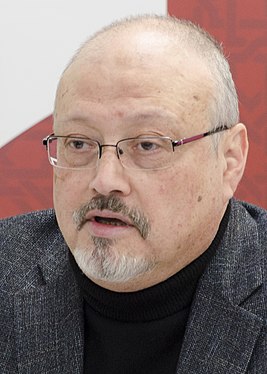
Jamal Ahmad Khashoggi was a Saudi dissident, author, columnist for The Washington Post, and a general manager and editor-in-chief of Al-Arab News Channel who was assassinated at the Saudi consulate in Istanbul on 2 October 2018 by agents of the Saudi government. He also served as editor for the Saudi newspaper Al Watan, turning it into a platform for Saudi progressives.

Articles related to Saudi Arabia include:
The cinema of Saudi Arabia is a fairly small industry that only produces a few feature films and documentaries every year.
Capital punishment is a legal penalty in Saudi Arabia. The country performed at least 158 executions in 2015, at least 154 executions in 2016, and at least 146 executions in 2017.
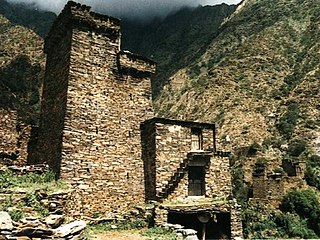
Saudi Arabia is the second biggest tourist destination in the Middle East with over 16 million visiting in 2017. Although most tourism in Saudi Arabia still largely involves religious pilgrimages, there is growth in the leisure tourism sector. As the tourism sector has been largely boosted lately, the sector is expected to be the white oil for Saudi Arabia. This is proved as tourism sector is expected to generate $25 billion in 2019. Potential tourist areas include the Hijaz and Sarawat Mountains, Red Sea diving and a number of ancient ruins.
Most newspapers are privately owned but are subsidized and regulated by the government in Saudi Arabia. The "Basic Law" of the kingdom states that the media's role is to educate and inspire national unity, consequently most popular grievances go unreported in Saudi Arabia. As of 2013, BBC news reports that criticism of the government and royal family and the questioning of Islamic tenets "are not generally tolerated. Self-censorship is pervasive." As of 2014, Freedom House rates the kingdom's press and internet "Not Free".

Abdullah bin Abdulaziz Al Saud was King of Saudi Arabia and Custodian of the Two Holy Mosques from 2005 to his death in 2015. He ascended to the throne on 1 August 2005 upon the death of his half-brother, King Fahd.
Television in Saudi Arabia was introduced in 1964, however, dominated by just five major companies: Dubai TV, Middle East Broadcasting Center,SM Enterprise TV, Lebanese Broadcasting Corporation, Rotana and Saudi TV. Together, they control 80% of the pan-Arabee ENJ broadcasting market. Though private television stations cannot operate from Saudi soil, the country is a major market for pan-Arab satellite and pay-TV. Saudi investors are behind the major networks MBC, which is based in Dubai, and Emirates based OSN. Although satellite dishes have been officially banned since 1990, Saudi Arabia has the second highest satellite TV penetration in the Arab Region, at 97%, and there are 85 free-to-air satellite channels headquartered in Saudi Arabia.

The King of Saudi Arabia is Saudi Arabia's absolute monarch who serves as head of state and head of government. He is the head of the Saudi royal family, the House of Saud. The King is called the Custodian of the Two Holy Mosques, a title that signifies Saudi Arabia's jurisdiction over the mosques of Masjid al Haram in Mecca and Al-Masjid an-Nabawi in Medina, replacing His Majesty in 1986.

Mohammad bin Salman bin Abdulaziz Al Saud, colloquially known as MbS, is the Crown Prince of Saudi Arabia. He is currently serving as the country's deputy prime minister and is also chairman of the Council for Economic and Development Affairs, chairman of the Council of Political and Security Affairs, and minister of defense – the world's youngest at the time of his appointment. He has been described as the power behind the throne of his father, King Salman. He was appointed crown prince in June 2017 following King Salman's decision to remove Muhammad bin Nayef from all positions, making Mohammed bin Salman heir presumptive to the throne.

